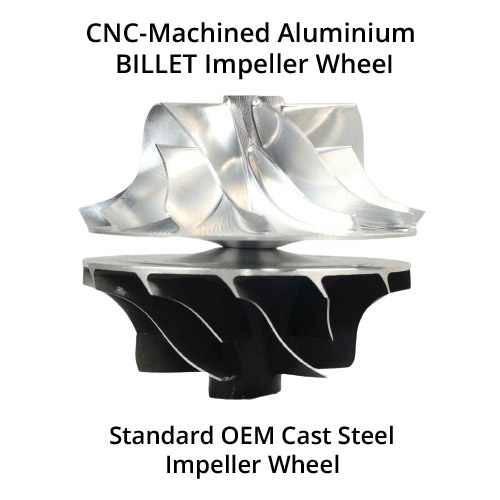What is a Billet Wheel Turbo and what are the Benefits?
What is a Billet Wheel Turbo?
First, what is a Compressor Wheel?
The Turbocharger Compressor or Impeller Wheel compresses external air, pushing it under high pressure into the intake manifold.
And higher pressure means a larger volume of air is pushed into the intake, so more power is developed by the engine.
See here for more information on Turbocharger Basic Working Functions.
Billet Turbo Meaning:
Billet Compressor or Billet Impeller Wheels (often also called MFS or FMW Compressor Wheels), are computer-designed for efficiency.
And the wheel is precisely machined (milled) on a 5-axis CNC mill from solid aluminium billet rods (hence the name “Billet”).
But technically the are MFS (Machined from Solid) wheels.

What are Billet Wheel Turbo benefits?
So the modified Compressor Wheel is the source of Billet Wheel Turbo benefits.
Billet Wheel Turbocharger Benefits include:
Longevity:
Billet wheels are more durable than regular cast wheels, being machined or milled from a solid forged mass.
So they resist high centrifugal stress better than traditional cast wheels.
In a turbocharger centrifugal force varies quickly between producing boost at spin up, to dump and spin down especially in city driving.
Casting a metal wheel requires heating and cooling into the cast shape.
Doing so changes the structure of the metal, and that can induce minute casting faults.
Efficient:
Billet Wheels are designed with slimmer hubs and thinner, larger fins to effect a larger fin surface area.
Combined with the use of forged aluminium, they are lighter than equivalent cast wheels.
Being light, the compressor will spool-up quicker with better response to changes in spin speed.
Being thinner, there is less air friction and less friction lowers the operational temperature of the compressed air.
And cooler induced air gives more power to engine combustion (hence the use of air inter coolers).
Larger fin surface and slimmer hubs provide increased flow capacity of high pressure air into the intake.
Extra compressed air entering the aspiration system, means more power output from the engine.
Replacing a standard turbo with a billet compressor wheel turbocharger.
Adding larger turbos designed for other or generic applications, will create problems with the ECU.
And usually also means that oil pipes, manifolds, exhaust flanges need to be modified or replaced.
The benefit of a Billet replacement upgrade is a swap-out of a standard turbo with no modification.
So they are a bolt-on upgrade.
You will then get the above-mentioned benefits without the extra cost of modifying intakes, exhausts and engine management tuning.
We have a great range of Upgrade Billet Turbochargers.
They are assembled, balanced in a Cimat & Turbo Technics High Speed Balancing (VSR) Rig, and Flow-tested on a Cimat Flow Bench Rig.
You can see our full range of aftermarket Billet Compressor Wheel Upgrade Turbochargers here.
Or have a look below for more specific, popular models below, all covered by our Exclusive 36 Month Warranty: (excluding Stage 1 & 2 Turbos).
Garrett Billet Turbo Upgrades.
2.8L, 3.0L, 4.2L Nissan Patrol Billet Turbo Upgrades.
Nissan Navara Billet Turbo Upgrades.
2.2L & 3.2L Ford Ranger / Mazda BT-50 Billet Turbo Upgrades.
Hyundai iLoad & iMax 2.5L Billet Turbocharger Upgrades.
Billet Upgrade Turbos suitable for 3.0L Toyota Hilux D-4D.
Billet Upgrade Turbos suitable for Toyota Prado 1KD-FTV D-4D.
Or if you have other queries on our range of Billet Upgraded Turbochargers, please contact our sales support on: 0490 059 316.
